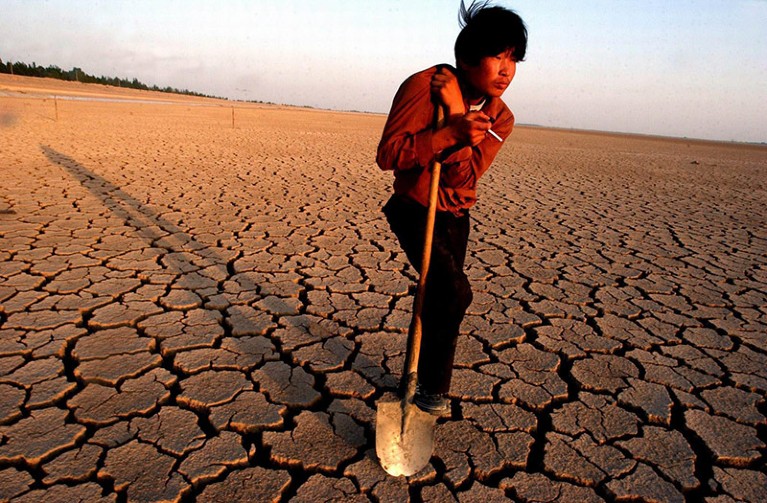
Communities in Gansu province in China store snow in the winter months for use in the dry summers.Credit: Hai Ying/EPA/Shutterstock
Among the world’s ‘poly-crises’, the crisis of water is one of the most urgent. Worldwide, around 2 billion people lacked access to safe drinking water in 2020; and an estimated 1.7 billion did not have even basic sanitation. Every year, more than 800,000 people die from diarrhoea, because of unsafe drinking water and a lack of sanitation. Most of those are in low- and lower-middle income countries. This is a mind-boggling and unacceptable situation. Even more so in an age when huge investments are being made in instant video calling, personalized medicine and talk of inhabiting other planets.
In 2015, the international community declared tackling the water crisis one of the United Nations Sustainable Development Goals (SDGs). The sixth SDG commits the world to “ensure availability and sustainable management of water and sanitation for all”. But the UN acknowledges that SDG 6 is “alarmingly off track”.
International diplomacy is finally starting to get its act together. In March, world leaders will assemble in New York City for the UN 2023 Water Conference. It will be the first such event in nearly half a century, a fact that by itself should shame us all.
Last October, the UN published the results of a consultation with government representatives as well as specialist and stakeholder communities on their priorities for the conference. Around 12% of respondents were from education, science and technology fields. The consensus was that data and evidence, improved access to knowledge (including Indigenous and local knowledge) and open research will be essential to getting SDG 6 back on track. Delegates attending the March conference will be looking to harness the full spectrum of established water sources and technologies, including freshwater and rainwater sources, treated groundwater, desalinated seawater and hydropower.
There’s a wealth of knowledge already out there, in the form of established technologies, innovative alternatives and research that captures centuries-old knowledge and the practices of communities themselves. In the past, such knowledge has been ignored, or what has been learnt has been forgotten. Twenty years ago, for example, the UN invested in a major piece of research that captured examples of how communities living in water-stressed regions have used research and innovation to access water. The research highlighted, for example, how people in arid regions of China store snow in cellars during the winter that can then be melted for use in the summer months.
Prerequisites for tackling the water crisis include consolidating what is already known and building on that knowledge. That’s why on 19 January, the Nature Portfolio of journals launched Nature Water. This journal will provide a space for all researchers — including those in natural and social sciences, and in engineering — to collectively contribute their knowledge, insights and the results of their learning, so that the world is on a more equitable and sustainable track. The launch issue includes research in fundamental, applied and social science, as well as opinion and analysis. Our editorial teams are committed to facilitating open science1.
Some paths forward are clear. Damir Brdjanovic at the IHE Delft Institute for Water Education in the Netherlands writes in Nature Water that there’s a vast body of research on alternatives to sewered sanitation — and how to use less or no water to safely dispose of faecal matter and inactivate pathogens2. There are alternatives to the flush toilet and underground, piped sewer networks. And Rongrong Xu at the Southern University of Science and Technology in Shenzhen, China, and colleagues report that there are ways to create hydropower, especially in Africa and Asia, without the same environmental and social impacts3.
However, research does not exist in a vacuum. The representatives of low- and middle-income countries also want to prioritize funding. The South African government, in its response to the UN consultation, says that the annual cost to meet the SDG water and sanitation targets is between 2.3% and 2.7% of the country’s gross domestic product (between US$7 billion and $7.6 billion annually). A project called the Global Commission on the Economics of Water, co-chaired by economist Mariana Mazzucato and climate scientist Johan Rockström (among others), is promising “new thinking on economics and governance” in time for the conference.
Conflict theory
Those who will be attending the conference in March also told the UN they want to see international cooperation be made a priority for water and sanitation, especially in an era of heightened geopolitical tensions. More than 25 years ago, former vice-president of the World Bank Ismail Serageldin famously wrote that twenty-first-century conflicts would be over water, rather than oil. We are fortunate that this has not yet happened, although Serageldin told Nature that relations between countries that share water sources are worsening. Egypt is formally in dispute with Ethiopia over dam-building projects on the Nile River; the same is true of India and Pakistan in the Indus River Basin.
In its response to the UN, Egypt’s delegation observed that the majority of people rely on water sources that are shared between nations, most of which lack formal agreements, including all-important data sharing agreements. Rhea Verbeke, at the Catholic University of Leuven in Belgium, writes in Nature Water of the “sobering experience” of seeing no external submissions to an open database on water purification that was created more than one year ago4.
The delegates assembling in New York need to accept that their countries’ visions will not be realized until all nations can somehow carve out a path to cooperate amid tension and conflict. Research can help to provide at least some of the right language, which is why it needs to be taken on board when decisions are being made. We in the Nature Portfolio intend to play our fullest part to make that happen.









